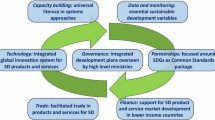Abstract
The article argues that proper attention to five major emerging trends will be crucial for the success of any development framework beyond 2015: (a) poverty and inequality, (b) economic crisis and job loss, (c) trade, finance and aid (d) rights, violation and violence and (e) climate change. The article goes on to use these trends to review the latest proposals on the post-2015, and provides a set of indicators based on new five fundamental principles of rights, equality, justice, sustainability and partnership for development through historic responsibility.
Similar content being viewed by others
References
Amnesty International (2013a) Human Rights: Facts and figures 2013. London: Amnesty International.
Amnesty International (2013b) Report 2013: World increasingly dangerous for refugees and migrants. London: Amnesty International.
Annie E. Casey Foundation (2012) 2012 KIDS COUNT Data Book. Baltimore, MD: Annie E. Casey Foundation.
Credit Suisse (2012) Global Wealth Report 2012. Zurich, Switzerland: Credit Suisse.
DARA and the Climate Vulnerable Forum (2012) Climate Vulnerability Monitor, 2nd Edition. A guide to the cold calculus of a hot planet. Madrid, Spain: Fundación DARA Internacional.
Espey, Jessica, Alison Holder, Nuria Molina and Alex Cobham (2012) BORN Equal: How reducing inequality could give our children a better future. London: Save the Children.
Gaibulloev, Khusrav and Todd Sandler (2008) ‘Growth Consequences of Terrorism in Western Europe’, Kyklos 61 (3): 411–424.
Gaibulloev, Khusrav and Todd Sandler (2009) ‘The Impact of Terrorism and Conflicts on Growth in Asia’, Economics & Politics 21 (3): 359–383.
Habitat for Humanity (2007) World Habitat Day Maze Exhibit on National Mall a Reminder of 1 Billion People Living in Slums, Habitat for Humanity International, http://www.habitat.org/newsroom/2007archive/10_01_2007_World_Habitat_Day.aspx, accessed 19 June 2013.
Human Rights Watch (2012) World Report 2012. New York: Human Rights Watch.
International Labour Office (ILO) (2011) World of Work Report 2011: Making markets work for jobs. Geneva: International Labour Office.
International Labour Office (ILO) (2012) Global Employment Trends for Women 2012. Geneva: International Labour Office.
International Labour Office (ILO) (2013a) World of Work Report 2013: Repairing the economic and social fabric. Geneva: International Labour Office.
International Labour Office (ILO) (2013b) Global Employment Trends for Youth 2013: A generation at risk. Geneva: ILO, International Institute for Labour Studies.
International Labour Office (ILO) (2013c) Global Employment Trends 2013: Recovering from a second jobs dip. Geneva: ILO.
OECD (2013) Aid to Poor Countries Slips Further as Governments Tighten Budgets. Paris: OECD.
Olinto, Pedro and Jaime Saavedra (2012) ‘An Overview of Global Income Inequality Trends’, Inequality in Focus 1 (1), 1–4 Washington DC: World Bank.
Sumner, Andy (2010) Global Poverty and the New Bottom Billion: What if three-quarters of the world’s poor live in middle-income countries?, IDS Working Paper 349, Sussex, UK: Institute of Development Studies.
Sustainable Development Commission (SDC) (2003) Redefining Prosperity: Resource productivity, economic growth and sustainable development (SDC report), Sustainable Development Commission, UK, http://www.sd-commission.org.uk/data/files/publications/030627%20Redefining%20prosperity,%20resource%20productivity.pdf, accessed 29 June 2013.
Sustainable Development Solutions Network (2012) A Framework for Sustainable Development, Draft (19 December), Paris: Sustainable Development Solutions Network, http://unsdsn.org/files/2012/12/121220-Draft-Framework-of-Sustainable-Development.pdf, accessed 29 June 2013.
UNCTAD-JETRO (2010) International Trade After the Economic Crisis: Challenges and new opportunities (UNCTAD/DITC/TAB/2010/2). Geneva: UNCTAD.
World Bank (2011) World Development Report 2011. Washington DC: World Bank.
World Bank (2013) Human Development Report 2013. Washington DC: World Bank.
WTO (2013) Trade to remain subdued in 2013 after sluggish growth in 2012 as European economies continue to struggle. Press Release (PRESS/688), 10 April, http://www.wto.org/english/news_e/pres13_e/pr688_e.htm, accessed 25 June 2013.
WWF-UK (2006) Counting Consumption. Surrey, UK: WWF-UK.
Additional information
Argues for an integration of four dimensions, namely poverty and inequality, economic recovery, economic relations (trade, finance and aid), and human rights
Rights and permissions
About this article
Cite this article
Titumir, R., Kamal, M. Growing Together Sustainably: A zero-poverty post-2015 development framework. Development 56, 172–184 (2013). https://doi.org/10.1057/dev.2013.23
Published:
Issue Date:
DOI: https://doi.org/10.1057/dev.2013.23




